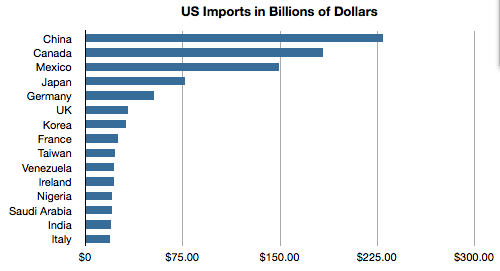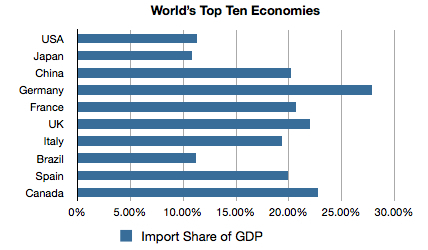Matthew Yglesias's Blog, page 2520
October 24, 2010
Top US Import Partners
I noted this morning that imports are less important to the American economy than people generally realize. Other developed countries tend to be much smaller and more specialized and so trade on both the imports and exports side is much more important to them. Americans mostly trade with other Americans. But when we do import, who do we import from?
Here's the Census' figures on what's happened so far in 2010:
That there's a lot of China should come as no surprise to anyone who follows the news. Indeed, I'd say following the news probably leads to a mistake overestimation of how important China is to the US economy. I'd say China accounts for much more than 20 percent of total trade-related media coverage, even though the PRC is just 18.5 percent of our imports and less than 17 percent of our total trade. By contrast Canada is systematically under-covered in the American media. This is especially true when you consider that Canada-based business establishments are much more likely to be directly competing with US-based ones.


The International
John Quiggin's rudimentary thoughts on the problematics of cosmopolitan social democracy are well worth reading. In addition to his notions on a programmatic level, it's worth noting a simple operational problem facing progressive democrats in the modern world—the lack of cross-border institutions in which politicians can collaborate. The historic organization for these purposes, the Socialist International, for historical reasons doesn't include the main progressive center-left party in India, or the United States of America, or Japan, or Brazil.
Meanwhile in the traditional continental European stronghold of formal social democracy it's now almost invariably the case that progressive majority coalitions are formed only through partnerships with green parties who, likewise, aren't part of the SI.
I would hardly want to argue that this institutional failing is the main problem facing progressives in forging a workable cosmopolitan egalitarian vision but it (a) doesn't help and (b) reflects some of the other underlying issues. And while obscure international organizations never solve anything, as such, there really is an urgent need for developed country progressives to get better at working across borders and taking seriously the point of view of progressives in poor countries.


The New Elite
I think Charles Murray's latest Washington Post op-ed decrying the rise of a new elite is one of those classic instances of "provocative" journalism that manages to meld the banal and the false in a superficially appealing way.
For example, what is one to make of this?
Talk to [the New Elite] about sports, and you may get an animated discussion of yoga, pilates, skiing or mountain biking, but they are unlikely to know who Jimmie Johnson is (the really famous Jimmie Johnson, not the former Dallas Cowboys coach), and the acronym MMA means nothing to them.
Of course this paragraph doesn't make sense to publish unless you assume that a large proportion of Washington Post readers know that "MMA" stands for "mixed martial arts." And the non-NASCAR Jimmie Johnson isn't just some former coach, he's familiar to 100 percent of NFL fans thanks to his ubiquity on Fox's Sunday broadcasts. And pro football is hardly a pursuit of the narrow elite—it's the most popular sport in America and one of the relatively few endeavors that, in this era of media fragmentation, united people (or men at a minimum) across race and class lines.
For the record, a map of pilates instructors in Branson, Missouri.


Iran's Strategy of Making Do
In a lot of ways the most newsworthy stuff in the latest WikiLeaks document dump is this Iran material discussed by Robert Farley that doesn't particularly serve a specific political agenda. During the period when the Bush administration was making a lot of noise about Iranian activities in Iraq, a number of us regarded the speakers as not particularly credible. Julian Assange has now provided us with extensive documentation that such claims were, at a minimum, broadly and sincerely believed by the military personnel on the ground and not just a communications strategy.
Bottom line, as Farley says:
…to be clear, while I'd be reluctant to suggest that Iran had a moral or legal right to intervene in Iraq, I consider it utterly unsurprising that Iran did so; attempting to manage the political situation in a neighboring country, while simultaneously weakening a potential enemy, is something that countries do. Indignation about Iranian intervention is absurd.
Which brings us to Dexter Filkins' article about how while the United States is attempting to achieve influence in Afghanistan through a military campaign that entails spending hundreds of billions of dollars, the Iranian government is just delivering millions in cash to Hamid Karzai's chief of staff. That seems smart! And it seems noteworthy to me that the much tighter objective resource constraints faced by the Iranian national security apparatus seems to have inspired more creating thinking about high-productivity outlays.


The Back Catalog
Julian Sanchez writes that highbrow film is increasingly facing competition from its own back-catalog:
On the movie side, though, I don't think it's that movies as such are in decline as elite entertainment, but that technology has effectively forced new highbrow movies to compete with the cinema's ample back catalog. Twenty years ago, if you wanted to have a "home entertainment center" that could serve as a decent substitute for the theatrical experience, you pretty much had to be willing to drop ten grand and devote a room of your house to it. Now a 50″ high-definition TV can be had for a few hundred dollars, and will fit against the wall of an apartment living room. It's not a perfect substitute: If you want to get a big group of people together and make a social event of seeing a big flashy action movie with the latest special effects, the theater is still probably your best bet. But if you want to watch The Seventh Seal or Citizen Kane with a couple other people, it's a viable alternative in a way that the smaller standard-def TV you'd find in an equivalent middle class home circa 1990 just wasn't. Moreover, for the cost of a $10 monthly Netflix subscription, you've got an ample and growing library of both classic and recent movies available on demand. Once those costs are sunk, and once the audio-visual quality is high enough, a lot of people will actively prefer to watch a quieter or more thoughtful movie at home with a glass of wine.
Here, again, if you're in the mood for (say) a big flashy sci-fi action movie, improvements in filmmaking technology mean that the latest theatrical release is going to have enough of an advantage to be competitive with the back catalog. Whatever else you might say about it, Inception is visually a lot more impressive than most old action sci-fi movies. (There are exceptions—Blade Runner springs to mind—but not a ton.) But if you're looking for a smart, artistically shot film with smart dialogue? Unless you're a truly voracious film buff, there are probably a couple hundred Criterion Collection films you haven't seen that are superior on those dimensions to anything made this year. Time and tech do a lot more at the margin to improve flicks than films.
This is logical to me although it doesn't meet my life experience. I went to see It's Kind of a Funny Story on Monday at the local Landmark Theater even though I could have watched The Big Sleep on Netflix streaming at home and almost certainly seen a better movie. To me, at least, the movie theater has become an unusual point of refuge from the ubiquitous connectivity of my laptop, smart phone, iPad, etc.—a place where social convention makes you shut up and watch in a way that's hard to achieve at home.
But then again, I live in easy walking distance to two movie theaters. If going to catch something new weren't a matter of a 5 minute jaunt to Gallery Place or a 15 minute stroll to E Street I might have a different attitude. Do you need to wait for the bus to go see a movie when you could just watch at home? Maybe not. And the calculus looks very different if you have kids and going to the movies versus just watching one after you've put them to bed involves adding the cost of a sitter, etc.


The USA Is Not Very Import-Dependent
One response to my proposal to stimulate demand with a helicopter drop of money is the idea that the benefits will somehow all flow to Asia:
So, you give me an envelop full of cash, I go and buy a pair of shoes made in China, and a TV set made in Korea. That will certainly stimulate China and Korea; though it's not quite clear to me what they are going to with that cash.
I think this reflects a widespread misunderstanding about the impact of trade on the United States economy. Not misunderstanding about the merits of trade even, just misunderstanding about the extent of trade. The United States is a very big country and consequently we're actually a country that doesn't trade all that much compared to most developed nations. You can see this if you look at imports as a share of GDP in the top ten economies (GDP calculated at market exchange rate levels here because we're talking trade):
As you can see, we do less importing than ever country on this list except Japan and Brazil. Importing is an important part of American economic life, but it's not that important. The vast majority of US demand for goods and services is met domestically and the United States is more reliant on the internal market to meet its demand than are China or Canada or Germany or what have you.


October 23, 2010
The Funniest Thing I've Heard All Week
In a couple of tweets the morning, Joshua Foust said:
I finally figured out what bothers me so much about Wikileaks, and it is precisely what bothers me about the DOD: a sense, on both sides… … Of hypocritical entitlement, combined with arrogance and a blithe disregard for consequences. Wikileaks is the Left's Pentagon.
Provocative! To which Andrew Exum replied:
@joshuafoust You're being to harsh on the Pentagon: DoD has both systems of accountability and civilian and congressional oversight.
Congressional oversight! Of the Defense Department! We're truly doomed.


That Old Clinton Magic
Josh Marshall puts his finger on what's so odd about the new idea that Bill Clinton is some kind of political svengali who can/could help Democrats avoid their current political problems with his bold acts of strategic genius:
But let's not be born yesterday. Anyone over 35 has a good adult memory of the 1994 midterm. That's when Stan Greenberg was telling congressional candidates to run away from President Clinton, just two years after Stan helped engineer his election. Clinton was considered toxic politically in broad swathes of the country — swathes that anyone around then has to remember look an awful lot like the swathes where President Obama is toxic today. And even though the country was then in a comparatively mild economic funk rather than a full blown catastrophic and persistent recession, for all his political skills President Clinton couldn't do anything the stem the tide. He was impotent, diminished, helpless, crushed and all the rest.
Conversely, Bill Clinton cruised to re-election and survived a major sex scandal thanks to the fact that US economic performance got very strong. I think it's a mistake to write that all off to "good luck" or deny that real political skills were involved, but the skills at hand had to do with keeping himself, his administration, and his party focused on delivering the goods even as they were buffeted by all kinds of nonsense. Politics matters, a lot, but the reason it matters is that holding a political coalition together matters for policy and policy outcomes matter in people's lives. But popularity as such stems from improved quality of life, not message.


Commodity Prices: The Good, The Bad, The Ugly, and The Irrelevant
People continue to struggle in vain to produce some kind of possible bad consequences of "currency wars." The latest, the WSJ says that if everyone tries to devalue simultaneously the price of oil will go up:
When one country devalues its currency, others tend to follow suit. As a result, nobody achieves trade gains. Instead, the devaluations put upward pressure on the prices of commodities such as oil. Higher commodity prices, in turn, can cut into global economic output. In one ominous sign, the price of oil is up 8.7% since August 27.
If you try to reason in this direction, you end up tying yourself into knots. Is a higher price of oil "ominous." Well it depends why it's going up. If a bunch of equipment in the North Sea breaks, then the price of oil is increasing because the quantity of oil available to the world economy has declined. That's bad because oil is useful. But conversely, if the US economy were to start growing rapidly that would increase the demand for oil and lead to a price increase. That, however, would be a good thing. If the world's central banks engage in coordinated monetary stimulus, that will result in some inflation (and hence higher nominal oil prices) but some inflation would be helpful at the moment. But if Israel and Iran go to war, that will also increase the price of oil and it'll be terrible.
In general, higher supply of useful commodities is good (and leads to lower prices) and higher demand for useful commodities is a side-effect of good things (and leads to higher prices) so you can't just look at commodity prices and draw any conclusions about what's happening.


True Grit
It's pretty obvious that there's more to doing well in school—or, indeed, to getting ahead in any endeavor—than being smart. Apparently we're supposed to call this nexus of qualities grittiness:
There's a lot of interesting, if methodologically questionable, research on these findings. Check out this 2007 study, which attempted (via surveys, some administered online) to correlate the "grittiness" of a few thousand adults with their life outcomes. The researchers identified two major types of grit: "consistency of interests" and "consistency of efforts," asking respondents to rate themselves on a 5-point scale as to whether "new ideas and new projects sometimes distract me from previous ones," or "I have achieved a goal that took years of work."
The study concludes that even when IQ is controlled for, grittiness is associated with degree attainment and higher GPAs. The grittiest people, however, do not have the highest SAT scores. Perhaps those who perform well on standardized tests have so many other advantages going for them that they aren't forced to be particularly gritty in order to achieve their goals.
Personally, I only like to see the term used in the context of the southern breakfast food, the Liberal Party of Canada, or the phrase "gritty urban realism."


Matthew Yglesias's Blog
- Matthew Yglesias's profile
- 72 followers







